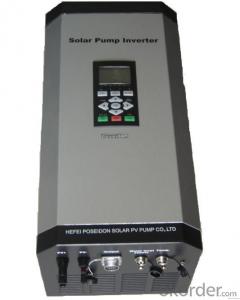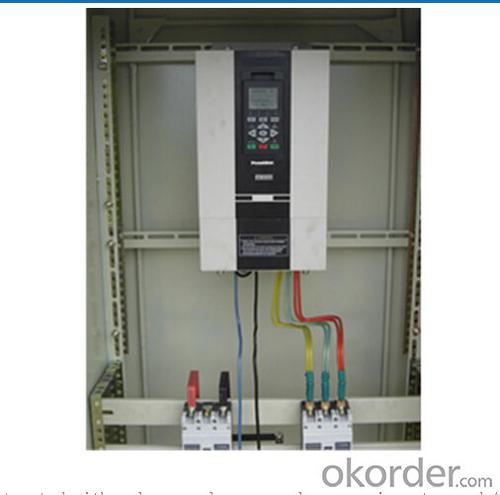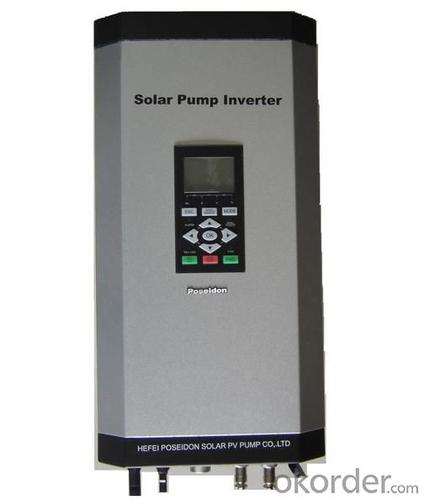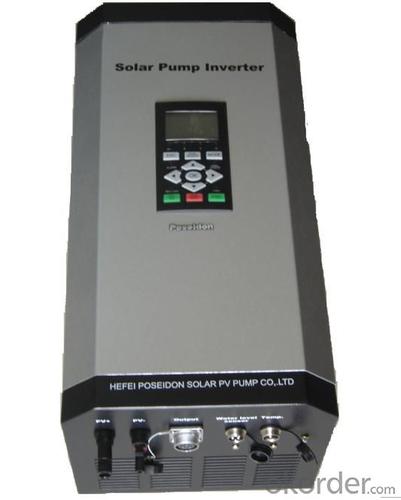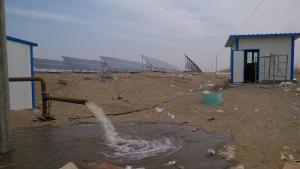Solar Pump 3 Hp FCPM100KH Inverter
- Loading Port:
- China Main Port
- Payment Terms:
- TT OR LC
- Min Order Qty:
- -
- Supply Capability:
- -
OKorder Service Pledge
Quality Product, Order Online Tracking, Timely Delivery
OKorder Financial Service
Credit Rating, Credit Services, Credit Purchasing
You Might Also Like
Solar pump inverter FCPM75KH Product Description:
Solar water pumping system is constructed with solar panel array,solar pump inverter and AC water pump, DC current produced from solar panel will be delivered to solar pump inverter,and it will convert it into AC current to drive water pump,and will automatically regulate output frequency according to sun radiance intensity,maximally realize MPPT tracking function.
Features
Adopting the proposed dynamic VI maximum power point tracking (MPPT) control method, with fast response, and reliable operation, achieves efficiency of 99%.
Designed with variable frequency driver, greatly improves efficiency
Extremely high efficiency
Digital mode control, with automatic operation and manual operation mode options
Complete protection functions
Adopts intelligent IPM module, with high reliability
LCD display and operation panel, in real time presents operating data
Optional for water level measurement and control circuit
Applicable for general ACC pumps, like centrifugal pump, piston pump etc.
Independent intellectual property; Highly effective, the redundant reliability, exempts the maintenance and the long life.
The pumps are soft started, fully protected.
No batteries are used. So better Sunlight, more water.
Datasheet.

- Q: Can a solar pump be used for water supply in refugee camps or emergency situations?
- Yes, a solar pump can be used for water supply in refugee camps or emergency situations. Solar pumps are ideal for such scenarios as they are reliable, cost-effective, and environmentally friendly. They can operate without the need for electricity or fuel, making them suitable for remote areas with limited infrastructure. Additionally, solar pumps can provide a consistent supply of clean water, ensuring that the basic needs of individuals in refugee camps or emergency situations are met.
- Q: How does the angle and orientation of solar panels affect the performance of a solar pump?
- The angle and orientation of solar panels have a significant impact on the performance of a solar pump. The angle determines the optimal positioning for capturing sunlight, maximizing the conversion of solar energy into electricity. Tilting the solar panels towards the sun at an appropriate angle ensures maximum exposure to sunlight throughout the day, enhancing the pump's efficiency. Additionally, the orientation of the solar panels, typically facing south in the Northern Hemisphere and north in the Southern Hemisphere, ensures proper alignment with the sun's path for optimal energy absorption. Overall, proper angle and orientation of solar panels are crucial in maximizing the performance and output of a solar pump system.
- Q: Can a solar pump be used in areas with limited access to water demand?
- Yes, a solar pump can be used in areas with limited access to water demand. Solar pumps are an efficient and sustainable solution for pumping water in remote locations where traditional electricity supply may not be available. They can be powered by solar energy, eliminating the need for grid electricity or fuel, making them cost-effective and environmentally friendly. Furthermore, solar pumps can be designed to meet specific water demand requirements, ensuring efficient water supply even in areas with limited access to water resources.
- Q: Are there any limitations to the size of the solar pump system that can be installed?
- Yes, there are limitations to the size of the solar pump system that can be installed. The size is generally limited by factors such as available sunlight, available space for solar panels, and the capacity of the pump itself. It is important to consider these limitations to ensure the system can effectively meet the water demands while operating efficiently.
- Q: Can a solar pump be used for water supply in a campground or recreational area?
- Yes, a solar pump can be used for water supply in a campground or recreational area. Solar pumps are an efficient and sustainable solution for water supply as they utilize solar energy to power the pump, eliminating the need for electricity or fuel. They can be used to pump water from a well, river, or other water sources, providing a reliable and eco-friendly water supply for campers and visitors in remote areas.
- Q: Are there any risks of over-pumping with a solar pump?
- There are indeed risks associated with the use of a solar pump that extracts water at a rate faster than it can naturally replenish itself. One of the primary dangers is the depletion of the water source, particularly in regions with scarce water resources. This depletion can lead to a scarcity of water, decreased levels of groundwater, and even the complete drying up of wells or boreholes. Furthermore, over-pumping can have a significant impact on the local ecosystem and biodiversity. It can result in the drying up of important habitats such as wetlands, streams, or rivers, which serve as vital environments for various plant and animal species. This disruption can upset the natural balance and have adverse effects on local flora and fauna. Another risk involves the sinking or collapse of land, particularly in areas where groundwater levels are high. When water is excessively extracted, the ground can subside or give way, causing structural damage to buildings, infrastructure, and even the formation of sinkholes. Moreover, over-pumping can compromise the quality of water. As water levels decrease, the concentration of pollutants and contaminants in the remaining water can rise. This can render the water unsafe for consumption or irrigation. To address these risks, it is crucial to appropriately size and design solar pumping systems, taking into consideration the available water resources, local regulations, and the specific needs and limitations of the area. Additionally, implementing monitoring systems and establishing suitable controls can help prevent over-pumping and ensure the sustainable management of water.
- Q: Can solar pumps be used to pump water from wells?
- Yes, solar pumps can be used to pump water from wells. Solar-powered pumps are an efficient and sustainable solution for pumping water from wells as they utilize solar energy to operate, reducing the need for electricity or fuel. These pumps can be installed in remote areas where grid electricity is not available or expensive, making them an ideal choice for water extraction from wells.
- Q: How does a solar pump help in reducing waterborne diseases?
- A solar pump helps in reducing waterborne diseases by providing a reliable and sustainable source of clean water. By using solar energy to power the pump, it eliminates the need for manual pumping or reliance on fossil fuels, making it accessible in remote areas. This ensures a continuous flow of safe and clean water, reducing the chances of contamination and the spread of waterborne diseases.
- Q: Can a solar pump be used for waterfalls and cascades in gardens?
- Yes, a solar pump can be used for waterfalls and cascades in gardens. Solar pumps are designed to harness energy from the sun and convert it into power to run water features. They are a sustainable and eco-friendly option, providing a reliable source of energy to create stunning waterfalls and cascades in gardens without the need for electricity or traditional pumps.
- Q: Can a solar pump be used in areas with limited access to water treatment facilities?
- Yes, a solar pump can be used in areas with limited access to water treatment facilities. Solar pumps are particularly beneficial in remote or off-grid locations where there may be limited infrastructure for water treatment. They can draw water from natural sources such as wells, rivers, or lakes and provide a sustainable solution for accessing clean water without relying on traditional water treatment facilities. Additionally, solar pumps are environmentally friendly and cost-effective, making them well-suited for areas with limited resources or infrastructure.
Send your message to us
Solar Pump 3 Hp FCPM100KH Inverter
- Loading Port:
- China Main Port
- Payment Terms:
- TT OR LC
- Min Order Qty:
- -
- Supply Capability:
- -
OKorder Service Pledge
Quality Product, Order Online Tracking, Timely Delivery
OKorder Financial Service
Credit Rating, Credit Services, Credit Purchasing
Similar products
Hot products
Hot Searches
Related keywords


